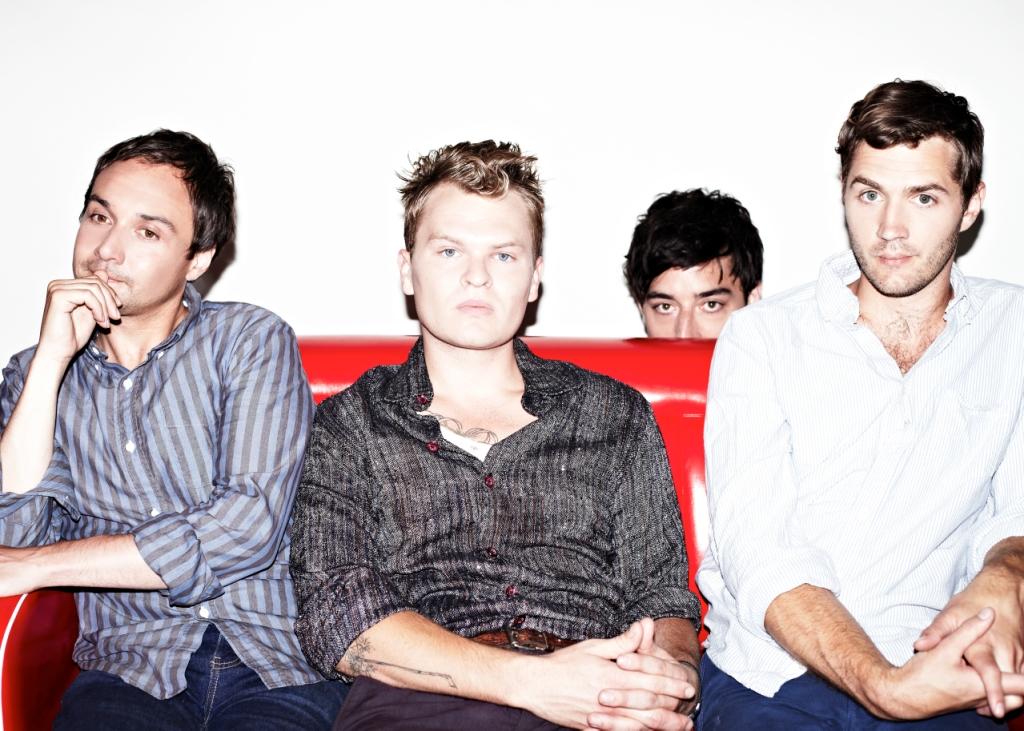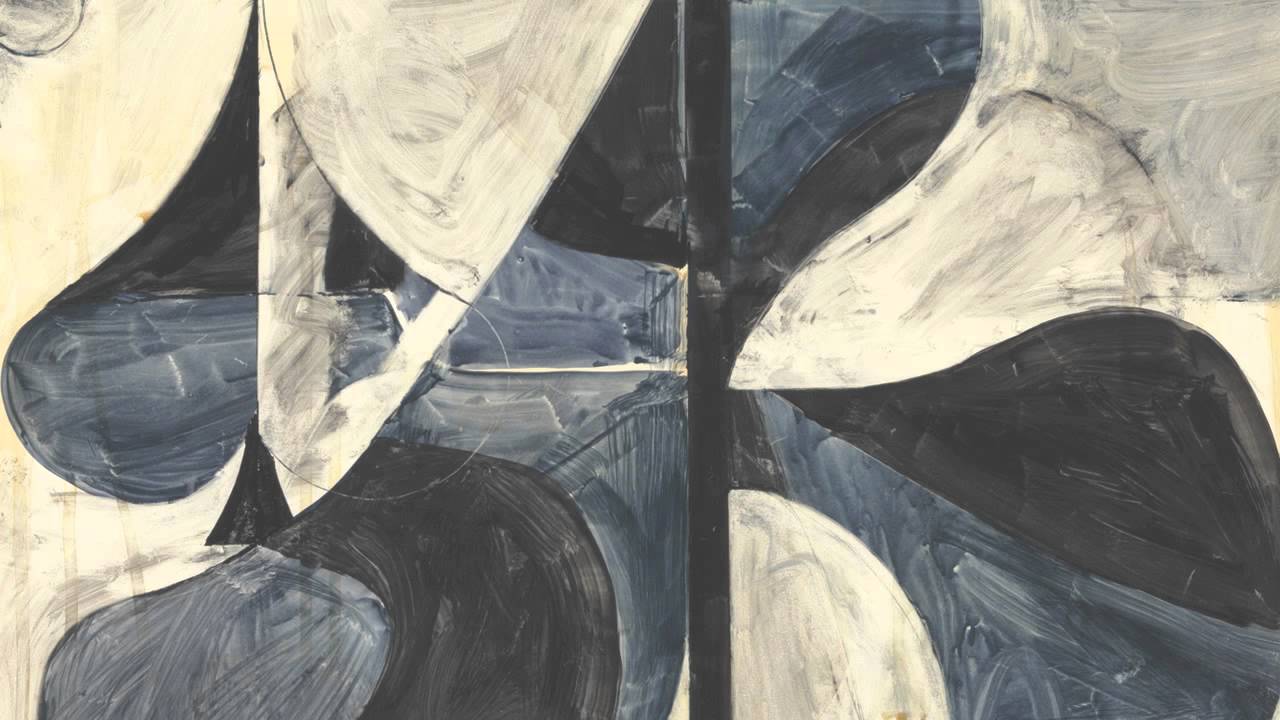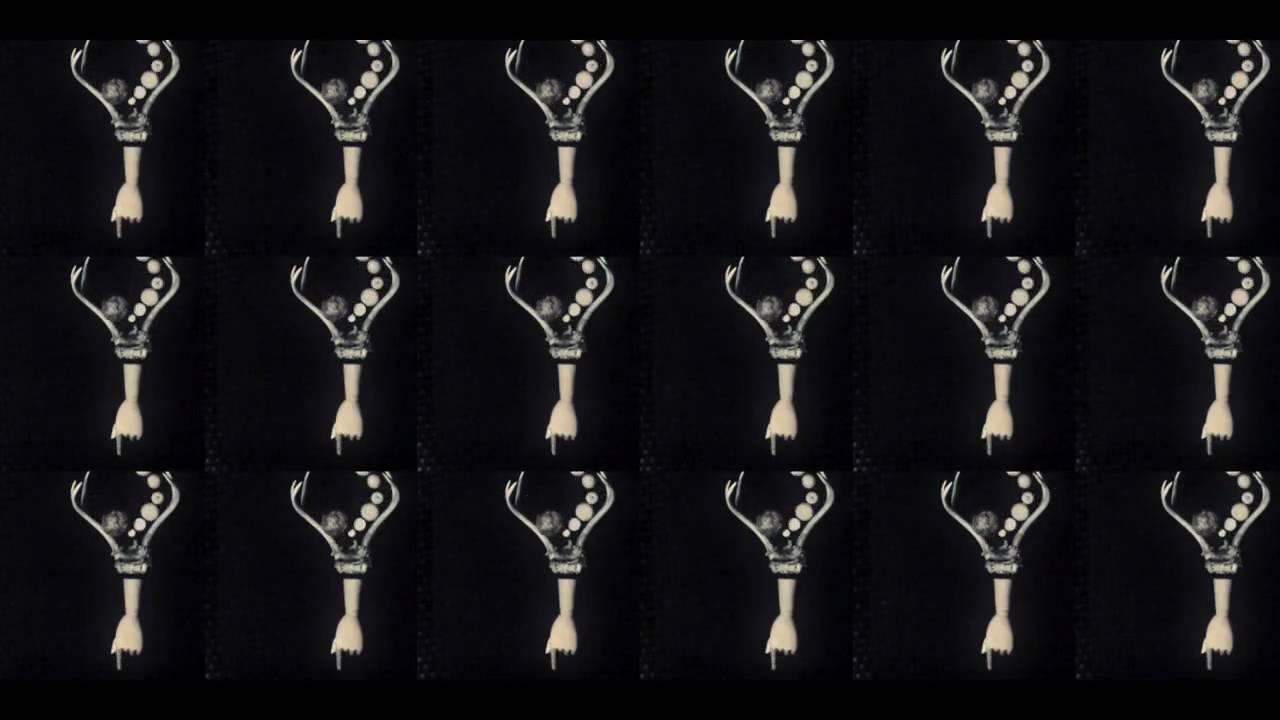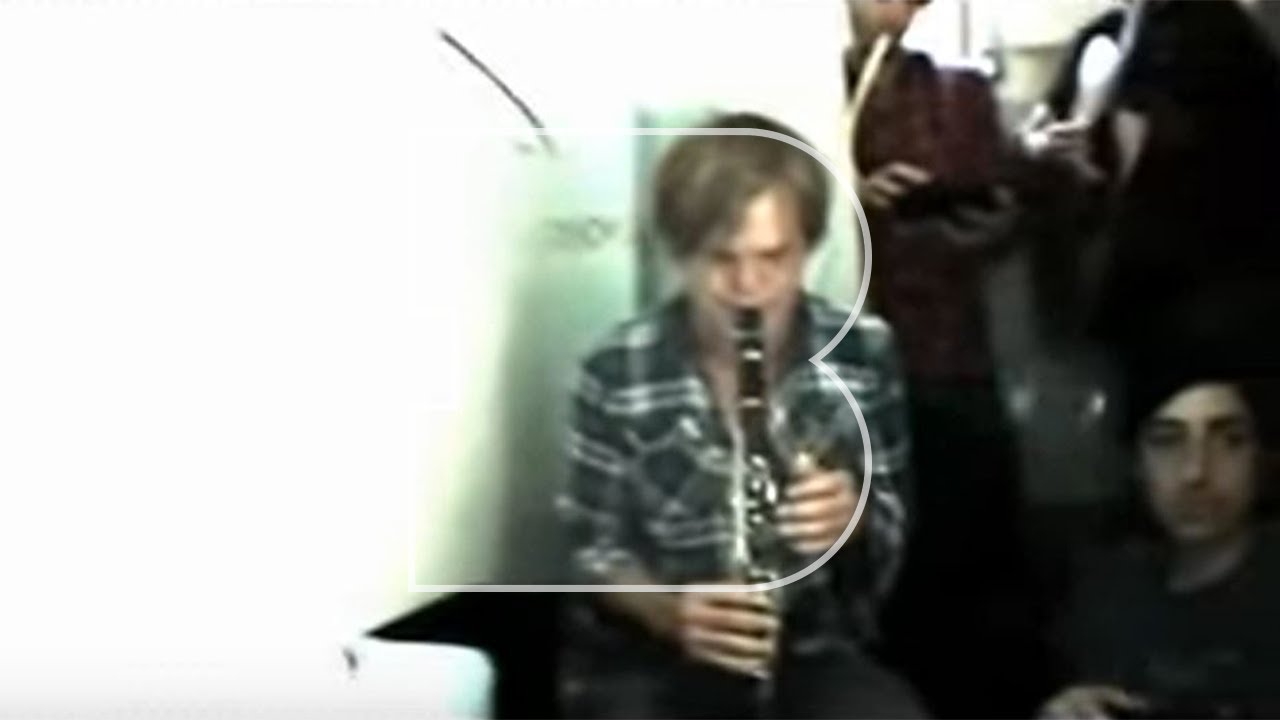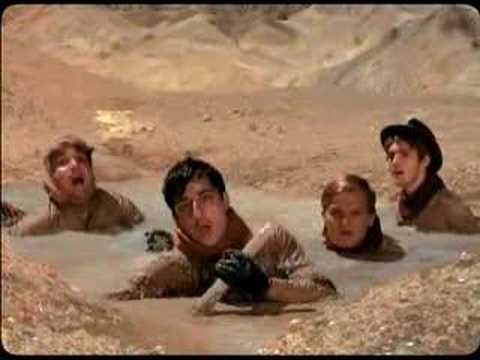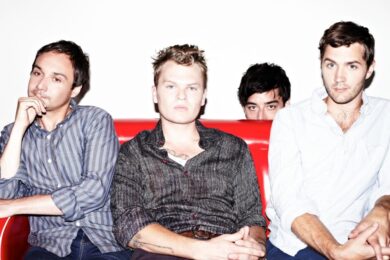You have to take the thing apart to see how it fits together: the R&B-loving founder from Boston, the sensitive soul from L.A., the producer-turned-bassist from Seattle, the multi-instrumentalist drummer from Chicago. All of them write, all of them sing, all of them could make it on their own.
It started in Ed Droste’s bedroom as a small-scale production of sullen atmospherics. After featuring Christopher Bear on percussion for 2004’s Horn of Plenty, Bear’s NYU roommate Chris Taylor was drawn in as an arranger before Daniel Rossen, the fledgling songwriter who lived across the hall, joined as a second singer and guitarist. Not being overly familiar with each other, and with little experience of performing live between them, Grizzly Bear had to get acquainted on the road, learning how to steer their talents in the same direction.
When their first album as a group, Yellow House, became a critical smash in 2006, its four-part harmonies and infectious pop melodies took many by surprise. Rossen’s songwriting, steeped in Paul Simon and Van Dyke Parks, brought a new dimension to the band, while Taylor’s production, wind instruments and electronic treatments embellished the songs with expansive arrangements and glowing detail. Building on the momentum of consistent touring, follow-up album Veckatimest cracked the Billboard Top 10 in 2009, its cohesion and accessibility celebrated as a powerhouse of elegiac pop, the four personalities behind it more distinct than ever. But at this point, they were also available elsewhere: Rossen’s songbook filtered into Department of Eagles, a duo with his old NYU roommate Fred Nicolaus, while Taylor stamped his production aesthetic on the likes of Dirty Projectors, the Morning Benders and Twin Shadow.
With a bigger profile and a gruelling tour schedule, the band eventually fragmented into hiatus. Taylor put out a solo LP as CANT. Droste travelled the globe and got married. Rossen retreated from view and released a solo EP, Silent Hour/Golden Mile, earlier this year. Reconvening for new album Shields posed a challenge. There were writing retreats, a scrapped recording session in Texas and a return to Cape Cod (where Veckatimest was made) – all in an effort to let their contributions crossover in ways they haven’t before, to blend into a sound that’s progressive but still recognisable as Grizzly bear.
As a unit, what keeps the whole thing going? What makes it work?
Daniel Rossen: Um… [laughs] That’s a very big question to start the whole thing off! These days… I don’t know. We’ve grown as a band just from listening to each other and, as our tastes change, we try to incorporate all of our ideas into our records as much as we can and not have any one person dominate the direction of the band. Keeping things even is what keeps it going. We all have different modes of writing alone and together but we’ve kind of come to a point as a band where we’ve decided to keep things collaborative as much as possible.
The album has been finished for a few months now, you’ve done the promo and you’re about to start a huge tour. If you compare this moment with the same ones that followed Veckatimest and Yellow House, how does it feel?
DR: When we finished Yellow House, we were so young and so excited about the first record we made as the four of us. We were so deep in it, it was such a special thing at that time, such a romance releasing it. I don’t know if it was like that for everyone but it certainly felt like it. With Veckatimest, it really felt like we were on a roll; we just kept going and going and going. It really never stopped. That’s the thing: we did Yellow House, we went on tour for a long time and as soon we got off tour, we [Rossen and Fred Nicolaus] did In Ear Park; as soon as we finished In Ear Park, we started recording Veckatimest and soon as we finished doing Veckatimest, we started playing shows. We just went for five years straight, practically.
After that, we just stopped. We had to take a break and walk away for a while. The whole process with this record felt like starting over. We took enough time off that we… I don’t know. My head kind of went out of the game or something. Getting back into it was really confusing. It took a long time. Even touring, it was like: ‘Agh, can we do this again? Do we even know what we’re doing on stage?’ Jumping straight into bigger shows was a little disorientating. I think we’re all very confident players and we all know what we’re doing, but it doesn’t quite feel as natural at this point – but I don’t know if that’s a bad thing. I think we just need to… [mumbles inaudibly].
Was there ever a question of whether or not there might be another Grizzly Bear album together?
DR: Um… I mean… I don’t know. The thing is we don’t make concrete plans for each record, [giggles] you know? [The lines goes dead at this point and it takes several minutes to reconnect.]
You took some time out in the countryside during that hiatus. Was there a lot of uncertainty about the future or did it feel like a healthy pause?
DR: Y-yeah… I don’t know. Those were strange times. I didn’t fully move out of the city but I was spending the majority of my time in upstate New York, a lot of it in the winter. I recorded a lot of that [solo] EP in that space of time out there. But, yeah, I had a moment of… I felt a little bit shell-shocked by the touring experience of Veckatimest and part of me was just wondering if there was some other version of a life that I could have that wasn’t as heavily involved in the music industry. That’s not a natural setting for me personally, I guess. So, I don’t know, I was kind of thinking about that. In the future… [pauses] Every record we do is its own project, its own setup. I’m sure we’ll do something in the future. I don’t know that we’ll jump right back into it. Who knows? There could be another long break. I really don’t know.
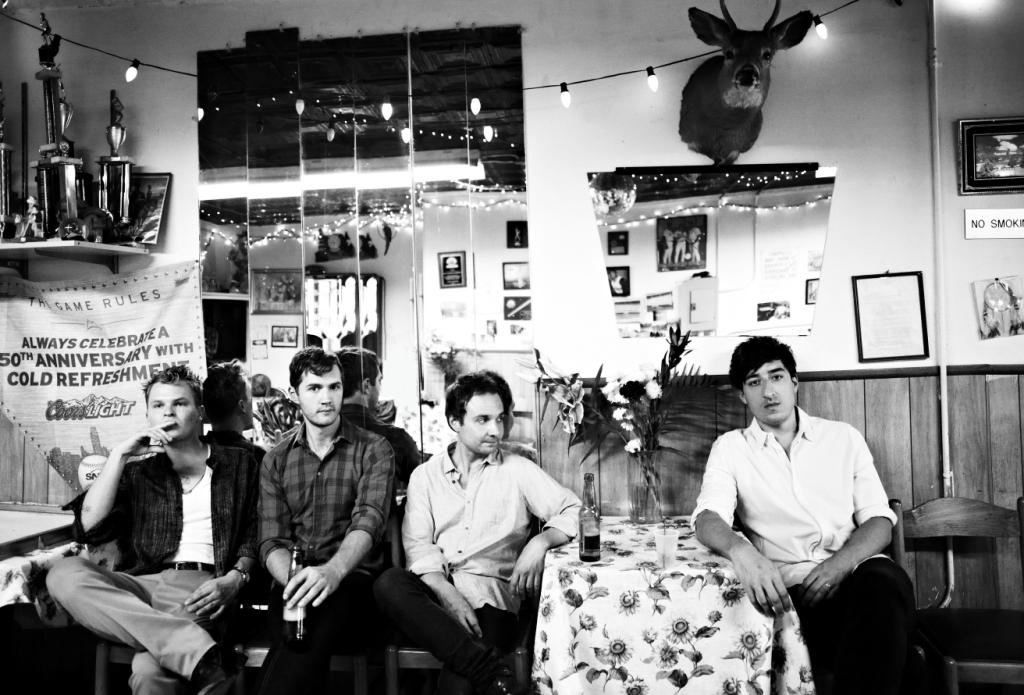
Is it fun being in Grizzly Bear or is there a danger of taking yourselves too seriously sometimes?
DR: It’s not so much about taking it too seriously. It’s a very intense thing. Sometimes I just feel you’re neglecting a lot of aspects of, I don’t know, human life that people have when you’re not on the road all the time. There’s something glamorous about it but… I lost a real sense of community. Your friends and loved ones are growing without you while you’re gone. I sometimes yearn for more stability in life, something simpler, but that could also be a case of the grass is always greener. I’m extremely lucky to do what I do, to have the kind of success we have. And I love playing shows, I do love touring and travelling.
It’s not like I dislike being in a band, it’s really fun, but it’s also… for some reason I think a lot about ageing gracefully in a band and it’s confusing. It’s hard to imagine growing into my thirties and having a family and still doing exactly what I’m doing while having it all work out correctly. I really don’t understand how that works. People do it, though! It’s very hard to imagine but, you know, it’s one step at a time. Our records are like that too. We don’t have a format; we just go at it and don’t worry about what it’s supposed to be or how it’s supposed to go, just take it day by day.
So is it harder when you’re following up a success? Do you set out with the aim of topping something like Veckatimest?
DR: Not really. Everyone wants to expand our sound, to make sure we’re growing as artists and not just doing the same thing forever. If anything, there’s that challenge. But we couldn’t do the same thing anyway, even if we wanted to. Of course, we want everything to be up to standard, which I think has been pretty high for a long time. [Sighs] I mean, God. [Exhales deeply]. People ask that a lot. ‘Oh, Veckatimest is a hard act to follow. Is there a danger of you slipping here?’ You just can’t worry about that. Sometimes we talk about it and it’s like, ‘Well, if that happens, it happens. All we can do is the best we can do and try to make something we like. If we can pull that off, then we’ll feel like we’ve succeeded.’ That was the whole name of the game: something ambitious that all four of us enjoy and feel a part of. It took us a while to find that but in the end we pretty much got there and it’s like, ‘Well, great – that’s the best we can do and we can’t worry about it beyond that.’
You have a background in jazz and classical music, so what part has that played in how you’ve evolved?
DR: Me and Chris Taylor and Chris Bear all have a pretty heavy jazz and classical background. I feel like in recent years we’ve been coming closer to embracing it more. There were baby steps of embracing it on Veckatimest but I think even more so on this new record. It’s about not worrying if something is too outside the correct genre that we’re supposed to be playing. It’s something I definitely feared when I was younger. As soon as I tried to write songs, I was scared of being too technical and letting the jazz theory and knowledge get in the way of intuitive songwriting. I think now we’ve been together long enough that we can let some of that creep back in a little bit, not necessarily to make things complicated or overly jazzy, but there’s no reason to be scared of letting that mind-frame into our song-writing process.
Previous records were definitely dreamier with lots of layered vocals and we’ve started pairing those back and taking them away, taking them away. That’s what we went for on this record: clearer performances and more direct arrangements, more specific ideas that are not always executed the same way… not always trying to do everything like a great big choral thing, but trying to do it from memory or trying to leave it really bare and simple. I think we’re just trying to peel the layers back to see what’s there.
When you come up with a song, what determines whether it’s going to be a Grizzly Bear, Department of Eagles or solo recording?
DR: Well, that’s always changing. Recently the way it’s been feeling is that if I finish a song and the full form is there – the lyrics and an arrangement I’ve already decided on – that pretty much automatically means it’s something I should work on alone. It doesn’t really work well to force parts onto Grizzly Bear: if you take something too far and there’s nothing left for the other band members to engage themselves with, then there’s nothing there for us to do. It’s more fun when there are blanks to fill in around basic chords or melodies and everyone gets to change it and play with it. There are songs on the new record that I just know there’d be no way I’d ever be able to come up with on my own, like the last track on the record [‘Sun In Your Eyes’]. [laughs] That’s what’s so wonderful about collaborating with people who have so much to offer: you can just sit back and watch something form. You can maintain a distance from it where it’s almost like, musically, you’re not even thinking.
As for Department of Eagles, we’ve really only done one truly serious record, In Ear Park [2008]. The stuff we did when we were younger was pretty… we didn’t really know what we were doing. It was just trying things out. Fred is basically doing his own thing right now and he’s not fully engaged in music. If he decides, or if we decide, that we have the time to write music together and make a full record again then… I don’t know. It all kind of depends on the schedule of Grizzly Bear because it takes so much time to make these records and promote them. Doing In Ear Park was great but it was also so overshadowed by the process of promoting Veckatimest in that we couldn’t properly give it its fair chance. We don’t want to do that again because it feels bad to put so much into a record and then leave it alone, not promote it properly.
But don’t you find in those situations it’s like a message in a bottle, that it finds its way to the right people in the end?
DR: Yeah, definitely. I mean I’m always happy there are people still discovering it. I don’t feel like it was lost or a waste of time. I’m still really proud of that record.
Well, it’s a beautiful album. Even with Archives 2003-2006 [a previously abandoned Department of Eagles effort belatedly released in 2010], you sound a little dismissive of it there but it’s surprisingly cohesive and was one of my favourite releases that year. Do you think it was just a throwaway?
DR: No, no. It definitely wasn’t a throwaway – at all! We worked like crazy on that. [laughs] We really wanted it to be the best it could be. We just didn’t give it a chance, whereas with Grizzly Bear we tend to go really deep. It’s such a big production; we’ll do the record and then spend a year and a half touring it, trying to get it around. Fred and I are just not as… not as good at that anyway. But that’s the breakdown these days. Grizzly Bear has become very collaborative, very collective. That’s kind of why that EP happened: if I get to the point where I just want to do the songs a certain way, if I just know how I want them to be or I don’t want to add anything to them, then they’ve come to me unified.
Inspiration can come and go; you can’t always control it, especially when faced with a schedule. So how do you summon the muse?
DR: Uh, you don’t. [laughs] You just don’t. I think that’s part of why it took so long. Writing on my own, it just happens whenever and if it works, that’s great. If it doesn’t, it doesn’t count. I used to have a way of trying to make music all the time, even if it was silly, and every so often something would happen and that would become the song. With this record, we actually did intentionally sit down at one point, just seeing what happens if we play together [spontaneously] and I’d never really tried that before. ‘I’ll play some chords, you start singing, and we’ll just riff for a while, trying not to take it seriously or worry about it not being the most beautiful thing in the world.’ And, you know, a few things on the record came out of those moments, which is cool. I was always sceptical of writing like that because it just seems too casual, but it can work.
You all bring something different to the band but what is it about Chris Taylor’s production that ties it all together?
DR: It’s hard to say. Part of his strength is that he pushes us. He has his own aesthetic that he brings to bands: tones and approaches that I think we’d probably be afraid of on our own. He enables us to try stranger stuff; he pushes us to that side of ourselves. The recordings feel, not necessarily otherworldly, but like they incorporate so many different elements. It’s like: all of a sudden here’s a Nagra reel-to-reel tape recorder at the same time as a [Yamaha] DX7 synth from 1985 produced through some really clean pre-amps, so it’s almost like a whole history of recording in one song sometimes.
He’s always thinking of the whole palette, I feel, whereas Ed and I might be more worried about a melody or a lyric. There were a bunch of times on the new record where I would try to flesh out an arrangement by throwing down some harmony idea that seemed cool and he’d be like, ‘That’s good but… it just sounds like you. Let’s not do that. Let’s do something else: do the wrong thing and see what happens.’ [laughs] I don’t know how to do that on command but I’ll try! Sometimes it ended up working really well. I wouldn’t have done that on my own because I wouldn’t have pushed myself hard enough to try. He’s cool; a very unique and talented guy.
Now that you’re setting out on a huge tour, what do you know now that you didn’t the first time you hit the road?
DR: I now know that… well, maybe I did know then and just didn’t pay attention to it, but it’s very important to take care of yourself on tour – your health and your day-to-day psychological wellbeing – and to think about it like a job. Try to have fun, try to live in the moment and try to enjoy performing for people but without letting yourself get away from what you’re doing. You can let yourself drift into autopilot mode when you’re constantly going from one town to the next; you can really lose track of yourself and lose track of reality. [laughs] That’s boring to say but I feel like one of the biggest lessons of touring is that if you can’t do that, then you just won’t be able to keep on doing it.

